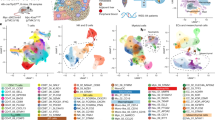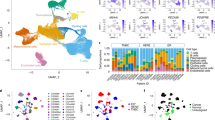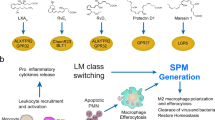Abstract
Background
Advanced prostate cancer (PCa) is often resistant to immunotherapy. In this study, we examined the role of CD276 in mediating immunotherapeutic effects through changes in immune cell infiltration.
Methods
Using transcriptomic and proteomic analyses, CD276 was identified as a potential target for immunotherapy. Subsequent in vivo and in vitro experiments confirmed its role as a potential mediator of immunotherapeutic effects.
Results
Multi-omic analysis suggested that CD276 was identified as a key molecule regulating the immune microenvironment (IM). In vivo experiments revealed that CD276 knockdown was found to enhance CD8+ T cell infiltration into the IM. Immunohistochemical analysis of PCa samples further confirmed the same findings.
Conclusion
CD276 was found to inhibit the enrichment of CD8+ T cells in PCa. Thus, CD276 inhibitors may be potential targets for immunotherapy.
This is a preview of subscription content, access via your institution
Access options
Subscribe to this journal
Receive 4 print issues and online access
$259.00 per year
only $64.75 per issue
Buy this article
- Purchase on Springer Link
- Instant access to full article PDF
Prices may be subject to local taxes which are calculated during checkout

Similar content being viewed by others
Data availability
All public database sources can be found in MATERIALS AND METHODS. And the Clinical data from STPH can be found in supplementary material.
References
Culp MB, Soerjomataram I, Efstathiou JA, Bray F, Jemal A. Recent global patterns in prostate cancer incidence and mortality rates. Eur Urol. 2020;77:38–52.
Lee DJ, Cha EK, Dubin JM, Beltran H, Chromecki TF, Fajkovic H, et al. Novel therapeutics for the management of castration-resistant prostate cancer (CRPC). BJU Int. 2012;109:968–985.
Teo MY, Rathkopf DE, Kantoff P. Treatment of advanced prostate cancer. Annu Rev Med. 2019;70:479–499.
Zhang Y, Zhang Z. The history and advances in cancer immunotherapy: understanding the characteristics of tumor-infiltrating immune cells and their therapeutic implications. Cell Mol Immunol. 2020;17:807–821.
Majidpoor J, Mortezaee K. The efficacy of PD-1/PD-L1 blockade in cold cancers and future perspectives. Clin Immunol. 2021;226:108707.
Benzon B, Zhao SG, Haffner MC, Takhar M, Erho N, Yousefi K, et al. Correlation of B7-H3 with androgen receptor, immune pathways and poor outcome in prostate cancer: an expression-based analysis. Prostate Cancer Prostatic Dis. 2017;20:28–35.
Husain B, Martinez-Martin N. A platform for extracellular interactome discovery identifies novel functional binding partners for the immune receptors B7-H3/CD276 and PVR/CD155. Ann Oncol. 2019;30:xi37.
Vigdorovich V, Ramagopal U, Lázár-Molnár E, Sylvestre E, Lee J, Hofmeyer K, et al. Structure and T cell inhibition properties of B7 family member, B7-H3. Structure 2013;21:707–717.
Mahnke K, Ring S, Johnson TS, Schallenberg S, Schönfeld K, Storn V, et al. Induction of immunosuppressive functions of dendritic cells in vivo by CD4+CD25+ regulatory T cells: role of B7-H3 expression and antigen presentation. Eur J Immunol. 2007;37:2117–2126.
Xavier FCA, Silva JC, Rodini CO, Rodrigues M. Mechanisms of immune evasion by head and neck cancer stem cells. Front Oral Health. 2022;3:957310.
Scribner JA, Brown JG, Son T, Chiechi M, Li P, Sharma S, et al. Preclinical development of MGC018, a duocarmycin-based antibody-drug conjugate targeting B7-H3 for solid cancer. Mol Cancer Ther. 2020;19:2235–2244.
Aggarwal C, Prawira A, Antonia S, Rahma O, Tolcher A, Cohen RB, et al. Dual checkpoint targeting of B7-H3 and PD-1 with enoblituzumab and pembrolizumab in advanced solid tumors: interim results from a multicenter phase I/II trial. J Immunother Cancer. 2022;10:e004424.
Acknowledgements
We would like to thank Prof. Qiangyuan Fan for excellent technical support.
Funding
This work was supported in part by a grant from the National Natural Science Foundation of China, Youth Project (#82101838,#82203367); Experimental Animal Fund of Shanghai Science and Technology Commission, (#22140903800).
Author information
Authors and Affiliations
Contributions
LJ and AJ wrote the manuscript. GYD, ZWT, and CHT collected patient data from our center. ZZJ, WH, and ZY contributed to data analysis, and BMY and GJ contributed to the in vivo experiment. MSY, ZJF, and YXD contributed ideas of the manuscript. All authors read and approved the final manuscript.
Corresponding authors
Ethics declarations
Competing interests
The authors declare no competing interests.
Ethics approval and consent to participate
All patients gave informed consent to the study, which was approved by the ethics committee of Shanghai Tenth People’s Hospital (No: SHSY-IEC-4.1/19-120/01).
Additional information
Publisher’s note Springer Nature remains neutral with regard to jurisdictional claims in published maps and institutional affiliations.
Supplementary information
Rights and permissions
Springer Nature or its licensor (e.g. a society or other partner) holds exclusive rights to this article under a publishing agreement with the author(s) or other rightsholder(s); author self-archiving of the accepted manuscript version of this article is solely governed by the terms of such publishing agreement and applicable law.
About this article
Cite this article
Liu, J., Kadier, A., Guo, Y. et al. Effect of tumor CD276 expression on infiltrating immune cells and clinicopathological features of prostate cancer. Prostate Cancer Prostatic Dis (2023). https://doi.org/10.1038/s41391-023-00690-2
Received:
Revised:
Accepted:
Published:
DOI: https://doi.org/10.1038/s41391-023-00690-2



